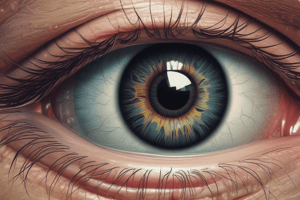Podcast
Questions and Answers
What is the main substrate for glucose metabolism in the cornea?
What is the main substrate for glucose metabolism in the cornea?
- Glucose (correct)
- Fatty acids
- Amino acids
- Glycogen
What is the byproduct of anaerobic oxidation of glucose in the cornea?
What is the byproduct of anaerobic oxidation of glucose in the cornea?
- CO2 and Water
- Pyruvate and ATP
- Lactic acid and ATP (correct)
- Ethanol and ATP
What is the location of the necessary enzymes for aerobic oxidation of glucose in the cornea?
What is the location of the necessary enzymes for aerobic oxidation of glucose in the cornea?
- Epithelium only
- Stroma only
- Endothelium only
- Mitochondria of epithelium, endothelium, and keratocytes (correct)
What is the primary function of the pentose phosphate pathway in the cornea?
What is the primary function of the pentose phosphate pathway in the cornea?
What is the primary factor influencing diffusion of oxygen, water, and nutrients across the cornea?
What is the primary factor influencing diffusion of oxygen, water, and nutrients across the cornea?
What is the mechanism of passive permeability in the cornea?
What is the mechanism of passive permeability in the cornea?
What is the primary function of the endothelial sodium pump in the cornea?
What is the primary function of the endothelial sodium pump in the cornea?
What is the characteristic of the normal cornea?
What is the characteristic of the normal cornea?
What is the mechanism of corneal sensitivity?
What is the mechanism of corneal sensitivity?
What is the characteristic of corneal sensitivity in the horizontal meridian?
What is the characteristic of corneal sensitivity in the horizontal meridian?
Flashcards are hidden until you start studying
Study Notes
The Cornea
- The cornea is the anterior 1/6 of the outer coat, acting as a covering lens, and is avascular and transparent.
Biochemistry
- Epithelium:
- High activities of enzymes of glycolysis, Kreb's cycle, and ATPase pump.
- High concentration of acetyl choline and choline esterases.
- Stroma:
- Low enzymatic activity.
- Collagen fibrils and glycosaminoglycans occupy the interfibrillar space.
- Fibrils prevent scattering of light, and swelling of fibrils increases light scatter with a hazy appearance of the cornea.
Glucose
- Main substrate.
- Stored glycogen in epithelium.
- Glucose metabolism:
- Anaerobic oxidation (glycolysis): 1 molecule of glucose gives 2 molecules of lactic acid and 2 ATP.
- Aerobic oxidation (Kreb's cycle): 1 mole of glucose is burnt into CO2, water, and 38 ATP.
Pentose (HMP) Shunt
- Extramitochondrial oxidation of glucose.
- Energy produced is not stored in ATP, but in NADPH2.
- Energy is used in biosynthesis.
- 35% of glucose is oxidized in this shunt.
Corneal Permeability
- Influences diffusion of oxygen, water, and nutrients from bathing fluids.
- Regulates corneal hydration.
- Determines transport of drugs across the cornea.
Passive Permeability
- Diffusion: molecules move across semi-permeable membranes (epithelium or endothelium).
- Molecules achieve equal concentration on the two sides of the membrane.
- They pass through intercellular pores.
- Solubility is more important than molecular size.
Phase Solubility
- Fatty phase in the epithelium and endothelium: permeable to fat-soluble substances.
- Watery phase in the stroma: permeable to water-soluble substances.
- Biphasic substances (both fat and water soluble) are more permeable.
Active Mechanism
- Endothelium sodium pump:
- (Na-K)ATP-ase enzyme.
Corneal Vascularisation
- Normal cornea is avascular.
- Compactness of stroma prevents vascularization.
- Stromal edema precedes vascularization.
Corneal Sensitivity
- Touch, cold, and pain receptors.
- Pain receptors are very sensitive, increasing from periphery to center.
- More sensitive in the horizontal meridian than the vertical.
- More sensitive in the temporal half than the nasal.
Studying That Suits You
Use AI to generate personalized quizzes and flashcards to suit your learning preferences.




